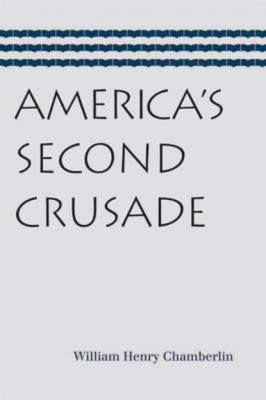ТОП просматриваемых книг сайта:
America’s Second Crusade. William Henry Chamberlin
Читать онлайн.Название America’s Second Crusade
Год выпуска 0
isbn 9781614872146
Автор произведения William Henry Chamberlin
Издательство Ingram
America’s Second Crusade
This book is published by Liberty Fund, Inc., a foundation established to encourage study of the ideal of a society of free and responsible individuals.
The cuneiform inscription that serves as our logo and as a design element in Liberty Fund books is the earliest-known written appearance of the word “freedom” (amagi), or “liberty.” It is taken from a clay document written about 2300 B.C. in the Sumerian city-state of Lagash.
Originally published in 1950 by Henry Regnery Company. Published in 2008 by Liberty Fund, Inc.
This eBook edition published in 2012.
eBook ISBN: E-PUB 978-1-61487-214-6
Contents
2. Communism and Fascism: Offspring of the War
5. “Again and Again and Again”
6. Road to War: The Atlantic
7. Road to War: The Pacific
8. The Coalition of the Big Three
9. The Munich Called Yalta: War’s End
10. Wartime Illusions and Delusions
11. Poland: The Great Betrayal
12. Germany Must Be Destroyed
13. No War, But No Peace
14. Crusade in Retrospect
Bibliography
Index
There is an obvious and painful gap between the world of 1950 and the postwar conditions envisaged by American and British wartime leaders. The negative objective of the war, the destruction of the Axis powers, was achieved. But not one of the positive goals set forth in the Atlantic Charter and the Four Freedoms has been realized.
There is no peace today, either formal or real. Over a great part of the world there is neither freedom of religion nor freedom of speech and expression. Freedom from fear and want is not an outstanding characteristic of the present age. The right of national self-determination, so vigorously affirmed in the Atlantic Charter, has been violated on a scale and with a brutality seldom equalled in European history.
The full irony of the war’s aftermath finds expression in the growing dependence of American foreign policy on the co-operation of former enemies, Germany and Japan. Three countries on whose behalf Americans were told the war was being waged, Poland, Czechoslovakia, and China, are now in the camp of this country’s enemies, so far as their present governments can achieve this purpose.
Much light has been thrown on World War II by the memoirs and papers of such distinguished leaders and statesmen as Winston Churchill, Cordell Hull, Harry Hopkins, Henry L. Stimson, and James F. Byrnes. A note of self-justification, however, almost inevitably intrudes in the recollections of active participants in such a momentous historic era. It requires a mind of rare insight and detachment to recognize in retrospect that premises which were held as articles of faith during the war may have been partly or entirely wrong.
My book is an attempt to examine without prejudice or favor the question why the peace was lost while the war was being won. It puts the challenging questions which are often left unanswered, perhaps even unthought of, by individuals who are deeply identified emotionally with a crusading war.
I should like to express gratitude to the following individuals for their kindness in discussing events and issues of the war with me: Mr. Charles E. Bohlen and Mr. George F. Kennan, of the State Department, Mr. A. A. Berle, former Assistant Secretary of State, General William Donovan, former head of the OSS, Mr. Allen W. Dulles, OSS representative in Switzerland, former Ambassadors Joseph C. Grew, William C. Bullitt, and Arthur Bliss Lane. I hasten to add that no one of these gentlemen is in the slightest degree responsible for the views expressed in this book. In fact, I know some of them would disagree sharply with some of the conclusions expressed here. However, they have all contributed to clarifying in my own mind the picture of America’s Second Crusade which is herewith presented.
William Henry Chamberlin
Cambridge, Massachusetts
May 3, 1950
America’s Second Crusade
Americans, more than any other people, have been inclined to interpret their involvement in the two great wars of the twentieth century in terms of crusades for righteousness. General Eisenhower calls his memoirs Crusade in Europe. And the mural paintings in the Widener Memorial Library at Harvard University show the American soldiers of World War I as chivalrous knights, fighting for the freedom of wronged peoples. They bear the inscription:
Happy those who with a glowing faith
In one embrace clasped death and victory.
They crossed the sea crusaders keen to help
The nations battling in a righteous cause.
This was how the war appeared from the beginning to a minority of Americans who felt close emotional ties with Great Britain and France. There were politically and socially less influential German-American and Irish-American minorities with opposed sympathies.
The majority of the American people were inclined to follow President Wilson’s appeal to “be neutral in fact as well as in name,” “to be impartial in thought as well as in action.” The tradition of dissociation from Europe’s wars was strong. It was only gradually that the United States was sucked into the vortex.
Despite the President’s intellectual sympathy with the British and French political systems, as contrasted with the German, there is evidence that Woodrow Wilson, until he felt his hand forced on the unrestricted submarine warfare issue, sincerely desired to keep America out of the world conflict. His imagination was fired by the hope of playing a leading disinterested role at the peace conference. He saw the advantage of keeping one great power outside the ranks of the belligerents, capable of playing the part of mediator.
The President was not an absolute pacifist, but his scholarly training had given him a strong sense of the inevitable brutality and frequent futility of resorting to force in disputes between nations. He became increasingly attracted by the vision of an international organization capable of maintaining peace.
Shortly after the sinking of the Lusitania Wilson

